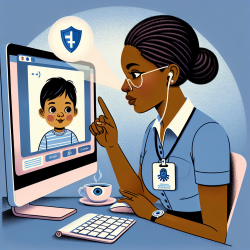Introduction
In the ever-evolving landscape of educational support, the Individualized Education Program (IEP) remains a cornerstone for ensuring that students with special needs receive the tailored instruction and services they require. However, the complexity of IEP planning and meetings can often leave educational psychologists feeling lost. This is where data-driven decision-making, coupled with innovative solutions like telepractice, can play a transformative role.
The Role of Data in IEP Planning
Data is a powerful tool that can bring clarity and direction to the IEP process. By analyzing performance metrics, behavioral data, and therapy outcomes, educational psychologists can make informed decisions that enhance the effectiveness of IEPs. This evidence-based approach not only aids in setting realistic goals but also in monitoring progress over time.
Telepractice: A Modern Solution
Telepractice, or online therapy, is revolutionizing how educational support services are delivered. For educational psychologists, this means access to a broader range of resources and tools that can be seamlessly integrated into IEP planning and execution. Telepractice offers several advantages:
- Accessibility: Online platforms break down geographical barriers, allowing students to receive therapy from specialists they might not have access to locally.
- Flexibility: Sessions can be scheduled at times that are convenient for both the student and the therapist, increasing participation and engagement.
- Data Collection: Digital platforms facilitate the collection and analysis of data, providing insights that are critical for tailoring and adjusting IEPs.
Overcoming Challenges
Despite its benefits, the transition to telepractice is not without challenges. Ensuring that all stakeholders are comfortable with the technology and that there is a clear understanding of the process is crucial. Training sessions and continuous support can alleviate these concerns, making the transition smoother for all involved.
Next Steps for Educational Psychologists
For educational psychologists feeling overwhelmed by the IEP process, embracing data-driven strategies and telepractice can be a game-changer. Here are actionable steps to consider:
- Embrace Technology: Explore online therapy jobs and platforms like TinyEYE that offer comprehensive telepractice solutions.
- Leverage Data: Utilize data analytics tools to gain insights into student progress and therapy outcomes.
- Collaborate: Work closely with teachers, parents, and therapists to ensure a cohesive approach to IEP planning.
Conclusion
Incorporating data-driven methods and telepractice into IEP planning not only streamlines the process but also enhances the quality of support provided to students. As educational psychologists, taking the next step towards these innovative solutions can lead to more effective outcomes and ultimately, a better educational experience for children in need.










